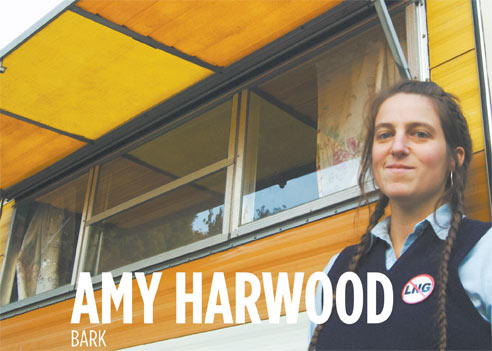Bark's Amy Harwood wins Skidmore Prize
Amy and three other local non-profit heroes have been chosen from dozens of nominations to receive this year’s Skidmore Prize from the Willamette Week.

To support Bark and receive great gift incentives, please visit http://giveguide.oaktree.com/.

Congratulations to Amy Harwood, Bark Program Director!
BARK
Amy Harwood
Amy Harwood never intended to get into environmental activism. Her first love was the political world, and her background is in election campaigning. But when she moved out here more than 10 years ago from her childhood home in Portland, Maine, to attend Lewis & Clark College, she fell in love with Mount Hood. "Coming from the East Coast, where there’s not a lot of public land, it just blew my mind," she said. And this being Portland—land of outspoken people with causes—she very naturally got swept up into advocacy for the area’s towering geological landmark.
What started 10 years ago as a passionate act of volunteering is now a full-time gig. Harwood currently works as a program director for Bark, a grassroots organization devoted to protecting all the roots, grasses, trees and waters that make Mount Hood the hulking thing of beauty it is.
Harwood’s hours are split fairly evenly between office work and time on the mountain.but what she really loves is being outside. "The more time you get on the ground, the better the advocate you are."
Harwood dreams of the day when Mount Hood will be seen as a scenic hideaway and great source for clean drinking water, and not simply a place to harvest lumber. The beautiful natural areas that surround the city are part of what makes Portland so exceptional, and she fears their loss. But ultimately, the way to save the forest is to make people aware of what’s happening.
On the second Sunday of every month, she leads tour groups to parts of the park in danger of being stripped for their resources. She describes the treks as relatively easy and a great way to educate lay people about the problems Mount Hood faces. Oftentimes members of her group climb the mountain only to find their favorite part of the forest has been logged.
These events frequently lead to what Harwood cites as her greatest source of pride: "When I can train somebody else to be a trainer."
She wants to use her prize money to expand Signal Fire (signalfirearts.org), the artist residency program run by Harwood and her husband. They take artists from the city and place them in a remodeled studio trailer on the mountain for two weeks with a bike and enough food to survive. "We want people to soak up the inspiration, and hopefully feel the same aesthetic calling I feel when I’m out there," she said.
Escapes to nature may be a way of getting away from civilization, but they’re not about running away from humanity. In fact, Harwood says it’s quite the opposite. "As soon as I get out there, I feel like a more whole person."
Written by Matt Graham, Willamette Week
Found in the 2008 Willamette Week Give! Guide, on newsstands November 12
Online at http://giveguide.oaktree.com/Awards.aspx.
Amy Harwood
Amy Harwood never intended to get into environmental activism. Her first love was the political world, and her background is in election campaigning. But when she moved out here more than 10 years ago from her childhood home in Portland, Maine, to attend Lewis & Clark College, she fell in love with Mount Hood. "Coming from the East Coast, where there’s not a lot of public land, it just blew my mind," she said. And this being Portland—land of outspoken people with causes—she very naturally got swept up into advocacy for the area’s towering geological landmark.
What started 10 years ago as a passionate act of volunteering is now a full-time gig. Harwood currently works as a program director for Bark, a grassroots organization devoted to protecting all the roots, grasses, trees and waters that make Mount Hood the hulking thing of beauty it is.
Harwood’s hours are split fairly evenly between office work and time on the mountain.but what she really loves is being outside. "The more time you get on the ground, the better the advocate you are."
Harwood dreams of the day when Mount Hood will be seen as a scenic hideaway and great source for clean drinking water, and not simply a place to harvest lumber. The beautiful natural areas that surround the city are part of what makes Portland so exceptional, and she fears their loss. But ultimately, the way to save the forest is to make people aware of what’s happening.
On the second Sunday of every month, she leads tour groups to parts of the park in danger of being stripped for their resources. She describes the treks as relatively easy and a great way to educate lay people about the problems Mount Hood faces. Oftentimes members of her group climb the mountain only to find their favorite part of the forest has been logged.
These events frequently lead to what Harwood cites as her greatest source of pride: "When I can train somebody else to be a trainer."
She wants to use her prize money to expand Signal Fire (signalfirearts.org), the artist residency program run by Harwood and her husband. They take artists from the city and place them in a remodeled studio trailer on the mountain for two weeks with a bike and enough food to survive. "We want people to soak up the inspiration, and hopefully feel the same aesthetic calling I feel when I’m out there," she said.
Escapes to nature may be a way of getting away from civilization, but they’re not about running away from humanity. In fact, Harwood says it’s quite the opposite. "As soon as I get out there, I feel like a more whole person."
Written by Matt Graham, Willamette Week
Found in the 2008 Willamette Week Give! Guide, on newsstands November 12
Online at http://giveguide.oaktree.com/Awards.aspx.




